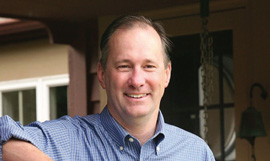When I graduated from high school and began working at Public Service Indiana, I vowed I would never miss a day’s work. Fortunately, I didn’t tell anyone, because three months later I fell down a flight of stairs, cracked my tailbone, hit my head, and had to take a day off to see the doctor. But for 90 days I was one of the most faithful employees Public Service Indiana had. Unfortunately, it established a pattern I’ve never been able to break. Just when I’m sailing along, making progress, I hit my head and am back where I started.
I thought about that this week when I read an article about a man from Perrysville, Ohio named Ron Kline, who went to work 54 years ago at a company manufacturing plumbing fixtures. In all that time, he’s never missed a day’s work, nor has he ever taken a sick day. (The article I read didn’t mention how often his wife had to stay home from her job to tend their sick children. Just sayin’.) In the 12 years he attended school, he only missed one day, to attend a funeral. It was an excused absence, but he’s still embarrassed about it. It gives me great pleasure to think that for three months in 1979, Ron Kline and I had the exact same attendance record.
We’ve been contemplating the fruits of the spirit the Apostle Paul described in his letter to early Christians in Galatia—love, joy, peace, patience, kindness, goodness, faithfulness, gentleness, and self-control.
This morning, I’d like to talk about faithfulness. Not faith, which is like joy and can’t be summoned on demand. You can’t order someone to have faith, though we do it all the time. I have a friend who has cancer and whenever he posts a health update on Facebook, several people are sure to tell him to “have faith,” as if faith is this easy little thing he can conjure up that will solve his problems, pay all his medical bills, provide for his daughters after he’s dead, and cheer up his wife. I once saw a cartoon of a man up to his chin in quicksand and another man walking past, whistling cheerfully, saying “Have faith.”
I think that’s why Paul didn’t say faith was a fruit of the spirit, but rather faithfulness. Dependability, reliability, fidelity, loyalty, devotion. Because those are qualities we can summon, virtues we can attain. And when we’re faithful, when we’re dependable, we become worthy of trust.
I was downtown at a lunch meeting this past summer and a man came up to me and asked me for money for food. We were standing right in front of Steak and Shake, so I told him I’d take him into Steak and Shake and buy him a meal. He became angry and said he just wanted money. I told him no, and he said, “Why not, don’t you trust me?”
I said, “Of course, I don’t trust you. How can I trust you? I don’t know you.”
This was a distinction he neither grasped nor appreciated. But trust is an outgrowth of faithfulness. We can’t trust someone until we’ve known them long enough and deeply enough to discern their faithfulness, their dependability.
We know this is true, because we all know people who can’t be depended upon, who aren’t worthy of trust. They don’t do what they promised to do, they don’t act responsibly, their word counts for nothing, they say white is black and black is white, but still expect others to trust them, and when others don’t, it is always the other’s fault and never their own.
If you’ve been in a relationship with an addict or alcoholic, you know what I’m talking about. I have a family member who’s an alcoholic. For 40 years, he was faithful and could be depended upon. Then he began drinking heavily and could no longer be trusted, but I still believed he could be trusted and was regularly disappointed and discouraged. He asks for money now and when I tell him no, he becomes angry and says, “Don’t you trust me?”
And I say, “I did at one time, but I no longer do.”
What has changed? His faithfulness, his dependability, his unwillingness or inability (I’m not sure which) to give his word and keep it.
I have a friend who ends up being the president of every organization he’s ever joined. He was complaining about it to me. I told him it was nothing to complain about, that he should be honored. It meant others found him dependable and trustworthy. He brightened up.
“I guess I hadn’t thought of it that way,” he said.
It later occurred to me that I haven’t been the president of anything since 1977 when I was president of our high school Spanish Club.
One of my professors in college ended each class period with a five minute quiz on the material we’d covered that day. Faithfulness works the same way. There’s a test every day. It goes like this: Did I do what I said I would do? Did I keep my word? Did I live up to my highest ideals? Did I tell the truth? Was I dependable? Did I show up for life today, or did I stay home and call it in?

